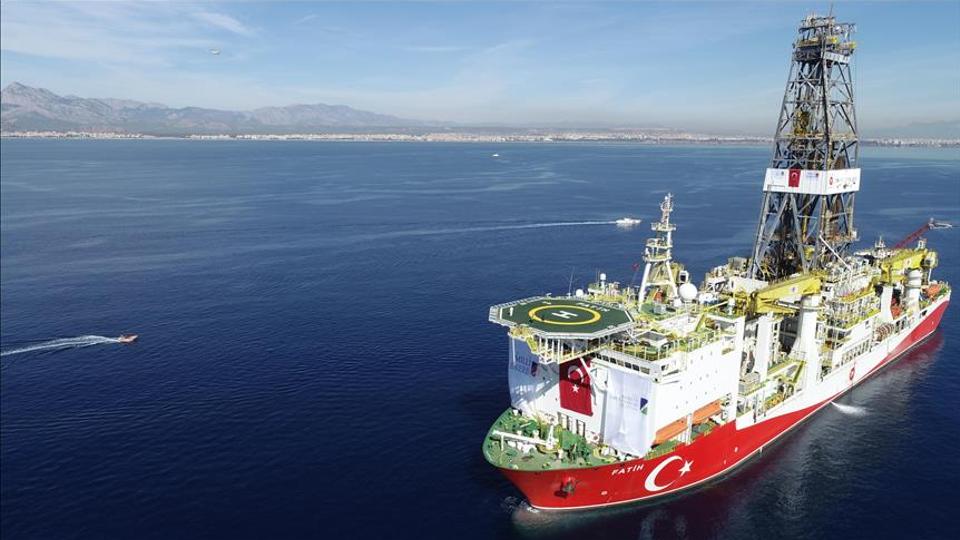Striving to extend its dominance in the Eastern Mediterranean where tensions revolve around energy resources, Turkey sees Cyprus as the weakest link in a regional alliance buffering Ankara’s ambitions, analysts said.
The bid comes as Turkey flexes its muscle across the Mediterranean from Libya to Syria, where Ankara has taken on diplomatic and military roles.
Although analysts don’t expect Turkey to conduct direct military action against Cyprus, they do believe Ankara will increase pressure on Nicosia to deter it from completing its energy exploration plans.
“Since this has become an issue of national prestige for all parties concerned Turkey will not back down,” said Hubert Faustmann University of Nicosia professor and Cyprus director of the Bonn-based Friedrich-Ebert-Foundation.
Cyprus has aligned itself with Greece, Israel and Italy in building an ambitious 2,000 km eastern Mediterranean gas pipeline to Europe despite Turkey’s hostility to the deal.
Nicosia also joined forces with Greece, Israel, Egypt and France in denouncing a maritime and security accord that Turkey signed with the UN-backed Libyan government.
The moves come amid growing tensions with Turkey over its activities in the region with Ankara expanding its claims over a large gas-rich area of which Cyprus says includes its territorial waters.
Faustmann said Turkey has a “spoiler capacity” in delivering on its claim that the hydrocarbon exploitation by Cyprus, Greece, Egypt and Israel will not be possible without the inclusion of Ankara.
“Turkey will not lose this confrontation because it is prepared to go further than all the other countries involved in the dispute. And it is likely to get away with it,” he told AFP.
Cyprus is divided between the Greek Cypriot south — an EU member state — and the Turkish Cypriot north, which has been occupied by Turkey since 1974 in response to an Athens-engineered coup.
“Since the Greek Cypriots are proceeding with their energy exploration, Turkey will continue to escalate the conflict in response,” said Faustmann.
“Turkey’s strategy is to create grey zones and disputed territories within the economic exclusive zones claimed by Cyprus and also Greece.”
He said Turkey can potentially spoil or at least delay the six-billion-euro EastMed project via its agreement with Libya since the pipeline goes through maritime zones claimed by Ankara.
“The pipeline will in all likelihood never be built. The biggest irony is that the most economically viable exploitation of Cypriot gas is by exporting it to Turkey,” said Faustmann.
The EastMed project is expected to make the three countries key links in Europe’s energy supply chain.
“By putting pressure or even increasing pressure on the Cypriot front, Turkey still holds the key to the EastMed’s future,” said energy analyst Cyril Widdershoven, founder of the consultancy firm Verocy.
He said Turkey “can block any agreement currently in place for offshore development” by establishing stronger military, navy and air force capabilities in north Cyprus.
“Such moves are not really costly but threatening,” Widdershoven told AFP.
Drones and naval base
In December, Turkey dispatched a surveillance and reconnaissance drone to the breakaway north amid tensions over offshore oil and gas exploration.
Turkish media have also reported that Turkey plans to build a naval base in north Cyprus where it already has around 35,000 troops stationed.
In its dispute with Cyprus over energy resources, Ankara has redeployed a drillship inside the island’s EEZ in block 8 where energy giants Eni and Total are licensed to explore.
Turkey already faces European Union sanctions over ships searching for oil and gas off Cyprus, whose government in Nicosia is not recognised by Ankara.
“All of Turkey’s aggressive actions so far centre around gaining hegemony and influence over the whole region,” Atlantic Council senior associate Charles Ellinas said.
“I do not believe that Turkey will escalate military moves in Cyprus. It has nothing to gain from such actions – so far it is achieving its ends without this,” he added.
He said Turkey was using the Cyprus gas row as a pretext to extend its sphere of influence.
“As evidenced by the fact that the areas it claims have low probabilities of discoveries…It is using its rogue agreement with Libya in the same way – as a pretext to extend its area of control,” said Ellinas.
Turkey insists the Turkish Republic of Northern Cyprus — recognised only by Ankara — has the right to explore around the entire island.
Ellinas believes any military escalation on Cyprus would attract stronger international reaction but “Turkey will maintain its current strategy of suffocating encirclement”.
Turkish President Recep Tayyip Erdogan said in November he envisaged joint energy exploration activities with Libya in the eastern Mediterranean.
Cyprus has criticised Turkey’s twin strategy of wading deeper into Libya’s civil war while also claiming energy-rich maritime territories in the Mediterranean.
UN-backed talks on reunifying the island as a bizonal, bi-communal federation collapsed in July 2017 and have not resumed, in part because of deep divisions over offshore gas.
The Cyprus government has no diplomatic relations with Turkey, which dismisses it as an exclusively Greek Cypriot administration.
Earlier this month, Cyprus President Nicos Anastasiades told Greek newspaper Ta Nea: “It is beyond obvious that Turkey is now vigorously pursuing an expansionist policy in the wider Mediterranean region, which is especially dangerous.”
He said Nicosia had repeatedly called on Ankara to enter a dialogue for delimitation of maritime boundaries between the two countries.
“The Republic of Cyprus has neither the intention nor the means to confront Turkey in the game of crisis and militarization,” said Anastasiades.










